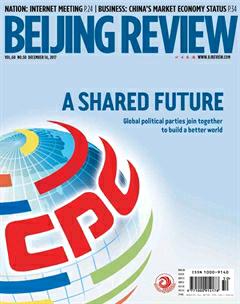Taking the Stage
By+Song+Luzheng
Bearing the name Working Toget her Toward a Community with a Shared Future for Humanity and a Better World: Responsibilities of Political Parties, the CPC in Dialogue With World Political Parties High-Level Meeting was held from November 30 to December 3 in Beijing. With the leaders of more than 200 political parties and organizations from more than 120 countries descending on Beijing for the meeting, the event broke a record in keeping with its theme by becoming the most diverse and highly attended global political party dialogue to date.
The broader context, namely that of Chinas recent history, provides the necessary backdrop for understanding the historic nature of the event. Chinas new leadership is moving forward, full of confi dence as the countrys reform and opening up enters a new era. This confidence is the effect of a Chinese path that has created an economic miracle over the past 40 years since China first adopted the principles of reform and opening up, and which began 70 years ago with the founding of the Peoples Republic of China. China has elevated itself to a position where it is now considered an equal in its interaction with the West and with the world, rather than a class outsider, anxious for approval at the table of powerful nations.
Today, with the CPC the inheritor and custodian of Chinese civilization, China plays the dual role of importer and exporter, in terms of ideas as well as products. The convening of this meeting is the expression of a traditional belief in China that everyone knows something which is worth learning about.
The meeting poses an opportunity for the CPC to share its approaches and expe- riences of governance, by way of stories which depict the history of both China and the Party, whilst also hearing the stories and lessons of others. Today, standing at the forefront of the global stage, China wields a profound infl uence in the modern world in a way it has never done before.
Promoting openness
High on the CPCs agenda is the opportunity to showcase Chinas openness. Since the outbreak of the global fi nancial crisis in 2008, Western politics has experienced a steady rise in populism, and significant electoral gains have been recorded by voices championing policies hostile toward globalization and free trade. Nations considered as major Western powers are becoming increasingly closed and concerned primarily with the promotion of self-interest. The same trend sees trade protectionism prevailing around the world. And so it falls to China, in its newly refurbished role as a major global power, to represent an alternative to the trends taking place in the West. In the context of this international atmosphere, this meeting is as an indication that the CPC is signaling a need for greater openness to the world.endprint
A mantra of openness is further refl ected in the schedule and arrangement of the meeting. In three previous CPC and the World Dialogue events, participants from other countries were provided with opportunities to exchange views face to face with members of the Standing Committee of the Political Bureau of the CPC Central Committee, such as Wang Qishan and Liu Yunshan, on the Partys ideas for national governance, and to learn more about grassroots governing practices. These participants were also granted the opportunity to visit the CPC Central Commission for Discipline Inspection and its online reporting center. They observed trials in Beijings courts and visited villages in east Chinas Shandong and Zhejiang provinces, in order to gain a greater understanding of rural governance.
The CPC in Dialogue with World Political Parties High-Level Meeting continues in this tradition. Aside from the attendance of high ranking CPC leaders, participants also had the opportunity to visit the Party School of the Central Committee of the CPC, where they held discussions, and attended an exhibition on Chinas achievements over the past five years at the Beijing Exhibition Center. The itinerary was intended to help participants better understand Chinas complex make up, all the while espousing the Partys focus on the principles of honesty and openness in the global arena.
embracing new responsibility
Another defining aspect of the meeting was Chinas sense of international responsibility. In an era considered by some to be the most turbulent since the end of the Cold War, many nations are looking for global leadership to cope with the interminable political, environmental and economic crises taking place around the world. Drawing on its 5,000 years of experience, China is not only working hard to appease tensions and conflicts in the world, but is also ready to share its own experience of success with others. By approaching dialogue with other nations as a conversation between equals, China is seeking to avoid the pitfalls of a hubristic foreign policy, and the temptation to impress its own political-economic model onto others. This approach signals a deviation from the global governance model practiced for so long in the West.
Learning from its own history the West worries that China, as an emerging power, seeks to challenge the established world order dominated by Western nations in a manner similar to the challenge mounted by Germany and Japan that ultimately led to World War II.endprint

